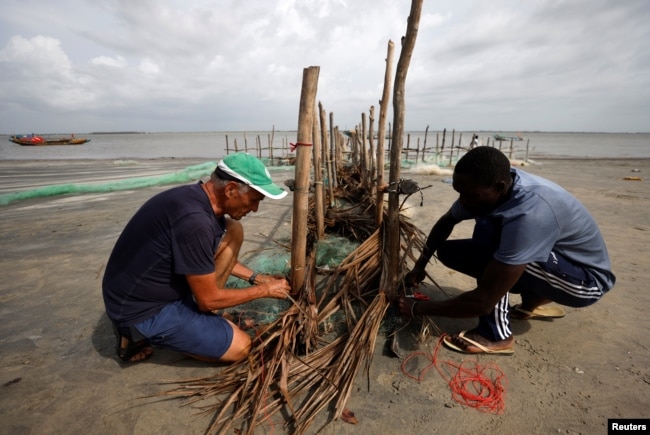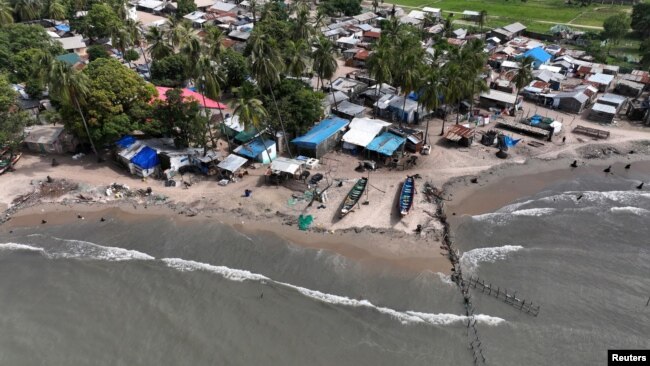沿岸の土地を守るセネガル島民
海水面が上昇し、海岸沿いの陸地がこのように侵食される事象は、多く報告されています。また、異常気象による高波、暴雨による被害も拡大しています。
2020年までの温暖化対策の目標を定めた1997年採択された京都議定書、バトンタッチする形で2015年合意されたパリ協定。
さぁ、地球は守られるのでしょうか?
VOAで英語を学びましょう!!
海岸の土地の喪失と戦うセネガルの島(和訳)
Island in Senegal Fights Loss of Coastal Land
July 31,2022
セネガル南部のディオグ島では、地元の人々がヤシの葉を使ったシンプルな木造構造で、沿岸の土地を守る取り組みを行っています。
彼らは、西アフリカの大西洋沿岸の一部を脅かしている浸食を防ごうとしているのです。
西アフリカでは、経済活動の半分以上が海岸で行われています。そして、人口の約3分の1が海岸沿いに住んでいます。地域によっては、半分覆われた木々や浸水した建物が、浸食がもたらした結果を示しています。
アンジェレ・ディアッタさんは、ディオグ・ディオラ村の女性グループの代表を務めています。彼女は、「海はとても遠くにあり、昔は海を見ずとも海鳴りが聞こえたものです。」現在では、高波が村の家々を通過することもあります。
西アフリカの海岸沿いには多くの川が海に注いでいます。国連によると、海面上昇、海水の増加、洪水の影響を最も受ける地域の一つであるとのことです。
ディオグ島では、湿った砂に木の棒を打ち込む方法が、島の一部の地域を守るのに役立っています。プロジェクトの主催者によると、これらのエリアは2019年以降、約30メートル拡大したそうです。
ジルベール・バセーヌさんは、海に対する防御を構築するのを手伝ってきた小学校の教師です。彼は拡張の過程を説明しました。「地盤を得るたびに、構造を拡張し、棒を追加し、少しずつ鳥が巣を作ると言われるように。」
これらのバリアは、カナダで作られたモデルに基づいています。ケベック大学の科学者の研究によると、この方法は他の場所の土砂を失わせることなく海岸を保護するものだと言います。ヤシの葉が砂を海岸に閉じ込め、砂が流されるのを防ぐのです。
「わずかな資源で、驚くべき仕事を成し遂げることができます、」と、バセーヌさんは、彼の仕事を見ようと子供たちが集まってきた海岸でこう言いました。
2020年にJournal of Coastal Conservationに掲載された研究によると、ディオーグの人々のような努力は十分でないことがわかりました。西アフリカの海岸はいまだ縮小傾向にあります。
ディオーグの人々の中には、自分たちがこの問題に打ち勝つことができると信じていない人もいます。村長のチェリフ・ディアッタ氏はこう言います:「認めるのは簡単ではないありませんが、いつかはこの村も動かなければならないでしょう。」
Island in Senegal Fights Loss of Coastal Land
On Diogue Island in southern Senegal, local people are using simple wooden structures with coconut tree fronds to save coastal land.
They are trying to prevent erosion that threatens parts of West Africa’s Atlantic coast.
In West Africa, the coast is home to more than half of the economic activity. And about one third of the population lives along the coast. In some areas, half-covered trees and flooded buildings show what erosion has done.
Angele Diatta is head of the women's group in the village of Diogue Diola. She said, “The ocean was so far away that we used to hear it without seeing it.” Now, high tides sometimes move through homes in the village.
Many rivers feed into the ocean along the West African coast. The United Nations says this makes it among the areas most affected by rising sea levels, increasing saltwater, and flooding.
On Diogue Island, a method of driving groups of wooden sticks into the wet sand is helping to protect some areas on the island. The project's organizers say these areas have expanded by around 30 meters since 2019.
Gilbert Bassene is a primary school teacher who has been helping build the defenses against the sea. He described the process of expansion. "Whenever we gain ground, we can extend the structure, add more sticks, as they say little by little the bird makes its nest."
These barriers are based on a model created in Canada. A study by scientists at the University of Quebec said the method protects coasts without causing the loss of sediment in other places. The coconut fronds trap sand on the beach, preventing it from washing away.
"With the little that we have, we can achieve extraordinary work," Bassene said on the coast, where children had gathered to watch him work.
A 2020 study published in the Journal of Coastal Conservation found that efforts like those by the people of Diogue are not enough. Coasts in West Africa are still shrinking.
Some people on Diogue do not believe they can beat this problem. The village chief, Cherif Diatta, said: "It's not easy to admit, but one day the village will have to move."
Words in This Story
frond– n. a large, long leaf
erosion – n. the slow destruction of something by natural forces
tide – n. the regular upward and downward movement of the level of the ocean that is caused by the pull of the Sun and the Moon on the Earth
achieve– v. to get or reach (something) by working hard

